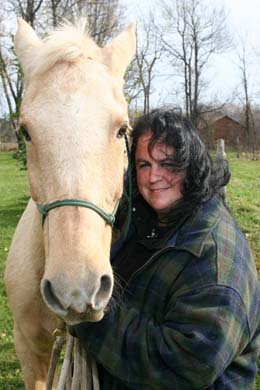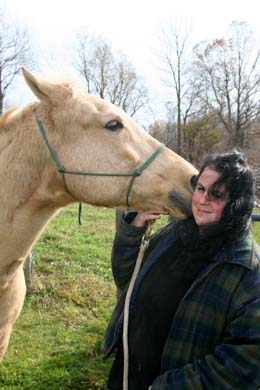
It would be only a slight exaggeration to say that Brockport's Elizabeth Oinen's life has always been about horses. From the earliest, age four or five, her activities included reading books about horses, drawing pictures of horses, riding her imaginary horse-bicycle, and later, writing stories about horses and 'galloping' on the playground while other children played games or climbed on swings. With most children, the fascination with horses fades as they grow older, but in Elizabeth's case it only grew stronger. At 12 she took on a paper route to pay for riding lessons and, once exposed to the hands-on relationship with a real horse, the hook was set - for life. Elizabeth's riding lessons began at TLC Stables on Swamp Road south of Brockport, under the tutelage of Maryln Lafferty and Joyce Tyler. She worked caring for the horses in the stable in exchange for lessons and, except for a year away at college, kept up her riding and work with horses there. She was motivated, at age 19, to buy her own horse because of the practice of the stable to bring in 'lesson horses' for summer riding school and then sell them at the end of the season. "I was frustrated because they'd get in a new lesson horse and I would trail ride it and work with it to make sure it was safe for lesson kids and then fall in love with it and then at the end of the season … they'd end up selling horses I was in love with. So finally I decided, 'I want a horse that's not going to go away, that can be my horse,' " says Elizabeth. That first horse was Jar, short for Jareth, a 17-year-old white Arabian gelding with experience in dressage, stadium and cross country jumping. Jar's previous owners gave Elizabeth a special sharp bit and some other heavy equipment and advised that she use brute force to get him to perform. But, instinctively, Elizabeth knew that was not the way to go. "I've always used a more natural attitude, I've always shied away from putting too much leather on a horse or using a harsh bit, where some people say your horse has a problem and use this bit, when my thought is if my horse has a problem, fix the problem with the horse an ideally the horse will respond. "Maryln Lafferty is the one who taught me the basic training techniques that I use now. I've continued to expand my knowledge since then but the basics I learned from her. That is: helping the horse to understand what you want from it before you put it in a place where there is so much at stake," says Elizabeth. When her marriage took her (and Jar) to Indianapolis, Elizabeth found work training carriage horses for a company which trained horses to drive in the city's historical district and to be sold to other horse and carriage companies around the country. At Lollypop Farm Lollypop's farm staff looks after cows, pigs, sheep, goats, donkeys, llamas, emus as well as horses. These animals are given up because their owners can't or don't want to care for them any longer, or they are seized in a court proceeding for neglect. In a short time at Lollypop, Elizabeth's talent and experience with horses was recognized and her job evolved into a specialty where now she is the primary staff member dealing with horses. Her biggest challenge at Lollypop came about two years ago when a semi-wild herd of neglected horses needed to be rescued. A special facility was set up in Scottsville to keep the 100 horses and it became Elizabeth's responsibility to care for them, socialize them sufficiently to be given veterinary care, and begin training so they could be safely put up for adoption. Some of the horses arrived in poor health, many with wounds from fighting and bites. Several stallions, who would fight with other horses to maintain dominance and breeding rights, were ultimately euthanized because they were judged untrainable. After the spring foals were born, there were 130 horses in this group. A little more than half of the herd was ultimately sent to a facility in Texas where greater prospects of adoption existed. With a remaining 65 horses, Elizabeth set to work with the goal of training them sufficiently to be calm, teachable and reliable so that new owners could safely adopt them. "I had 65 horses to take care of - feed, clean up after, worm them, work with the farrier and coordinate vet appointments. These horses were so wild they had to be tranquilized before anyone could approach them. "What I had to do in the beginning was to get them to allow being touched. I do that by a technique called approach and retreat. Starting about 10-feet away, find the point at which the horse is uncomfortable, go a little beyond that and find the point before which the horse leaves. Then you know where to start working with this horse. With this method of pushing the envelope a little bit further every time you work with the horse you can come to the point where you can touch the horse and build trust." Elizabeth has always used a natural approach of horsemanship in her work. Marty Roberts, the 'man who speaks to horses', also known in books and movies as the Horse Whisperer, is, she thinks, "a little melodramatic." "Marty Roberts is using the horse's own language to communicate with it," Elizabeth explains. "He thought about how horses communicate with one another and uses that in training techniques. But, I think every horseman, to some degree, does that." "A horse views a human as a predator. Since I first started working with horses I have preferred to look at the horses' psychology and figure out how to get a horse to respond by figuring out what the problem was instead of masking the problem with brute force." A large part of Elizabeth's success at training stems from her understanding that horses are herd animals with a strong need for social order. Working with, as opposed to against, a horse's character is key to success in training, she believes. Knowledge of a horse's character - how it thinks, acts and reacts - is vital to her training process. Recently, Elizabeth has adapted some techniques and uses equipment recommended by Pat Parelli, one of those influenced by the Marty Roberts' 'hook up' approach to natural horsemanship. Parelli is a former rodeo circuit rider who grew disenchanted with the way rodeo horses were treated and handled, often with heavy or sharp bits and leather or metal gadgets used to gain control, and devised newer methods based on understanding the horses' mental and emotional process. As a leading advocate of natural horsemanship, Parelli says, "Horses are easy once you know how they think and why they do what they do. If you can get enough emotional and physical control over yourself, and use horse psychology to communicate your wishes effectively, you have fantastic results. There is no reason for horses to be exposed to brutality, force and mechanics, or for people to suffer frustration and danger." It took two years, but eventually all the nearly wild horses Elizabeth cared for and trained were adopted by local families. She looks back at the experience with both pleasure and relief. "I love to work at Lollypop, it's incredibly rewarding. I feel like a superhero. We swoop in and save animals that are in mortal jeopardy. I'd always want to continue working with Lollypop in order to help horses and other animals that needed to be rescued." An estimated two million Americans own horses Contact Elizabeth Oinen by email: gothballgirl@juno.com or at Lollypop Farm: 585-223-1330. For more information about The Humane Society's Lollypop Farm log on to: http://www.lollypop.org/. Learn more about Parelli Natural Horsemanship: www.parelli.com. November 13, 2005 |

